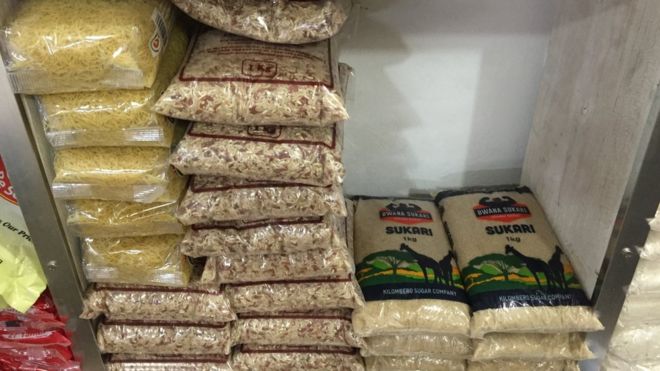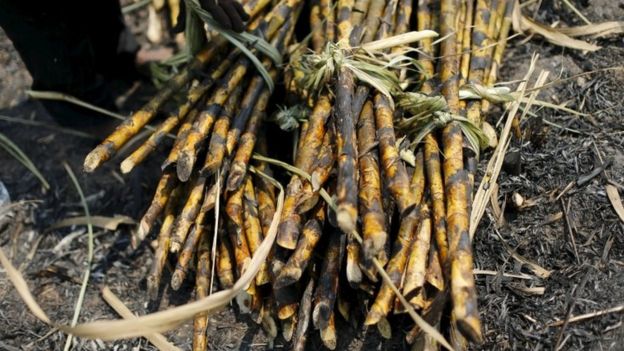- 20 May 2016
- Africa
-
(아프리카/탄자니아) 왜 탄자니아는 설탕이 충분하지 않은가?국제문제/아프리카 2016. 5. 22. 19:03
출처: http://www.bbc.com/news/world-africa-36330216
Why Tanzania doesn't have enough sugar

There is plenty of rice and pasta but sugar supplies have been running low and getting more expensive 쌀과 파스타는 풍부하지만, 설탕은 물량이 떨어지고 있어 가격이 상승함. You know there is trouble when you walk into East Africa's biggest supermarket and on the shelves where usually there is sugar, there are now eggs. 예전에는 동아프리카 최대 수퍼마겟에 가면 설탕이 있었는데, 지금은 달걀이 그 자리를 차지하고 있음을 볼 때, 뭔가 문제가 있다고 생각하게 된다.
Over the past month or so, Tanzania has been grappling with a shortage of sugar. Government and business accuse each other of creating the crisis, but many here believe it started with the decision of President John Magufuli in February to require sugar importers to obtain permits from State House. 탄자니아 설탕부족의 문제는, 많은 이들이 생각하기에, 설탕수입업자들이 공식 허가를 얻어야 한다는 결정에서 비롯되었다.
The president said the importation process was marked by corruption, the market flooded with poor quality or adulterated products and that the country had failed to protect local factories while importers grew rich.
"You find an officer issuing permits for sugar imports when local producers have enough sweetener for the market in that period," he said.
"Some of the imported sugar is of inferior quality compared to our locally produced sugar and some poses health risks to consumers. I thus direct that no permit be issued without my approval."
The intervention caused prices to double almost immediately. Now, in many market places, sugar is sold at $1.05 a kilo, while in some places it goes for up to $2, three times the government's fixed price. 설탕가격상승은 정부의 시장개입때문.
Hoarding? 저장, 비축 때문이라고?
Tanzania's annual domestic sugar consumption is about 420,000 tonnes while local production is 320,000 tonnes. This leaves a deficit of about 100,000 tonnes a year to be made up by imports.
Local producers have been complaining that rising imports have caused them cashflow problems while also threatening the livelihoods of 10,000 sugar cane growers. (cash flow: 현금흐름)
The government is now accusing traders and distributors of hoarding, saying they have been creating an artificial shortage to justify price hikes. The business community rejects this. (hoarding: 저장, 비축)
 REUTERS
REUTERSThe livelihoods of 10,000 Tanzanian sugar cane growers are in question Economist Prof Honest Ngowi says more research is needed before blame can be apportioned to producers or distributors.
But, he says: "The domestic factories are not able to produce the needed quantity. There is a need to interrogate why the domestic factories are not able to bridge the 100,000 tones deficit."
In the meantime, the government says it will import 70,000 tonnes of sugar to fill the shortfall.
Economists agree this is necessary but warn it comes with a hefty price tag. (it comes with a hefty price tag: 막대한 비용을 수반하다)
"Imports are costly to the economy," says Mr Ngowi.
It means parting not only with scarce foreign currency. "It also implies exporting jobs, incomes and government revenues."
And that makes those shelves full of eggs a matter of national economic importance.
'국제문제 > 아프리카' 카테고리의 다른 글
(아프리카) 가나에서 문제되는 인종주의자 간디 (0) 2016.09.24 (아프리카) 자신의 권리를 찾기 위해 처음으로 투쟁에 나선 南아프리카人들 (0) 2016.06.15 (아프리카) 문자로 일기예보 전하는 아프리카의 농업보험 (0) 2016.04.11 (아프리카/나이지리아) 나이지리아 방산 비리 관련 개인 및 회사들 기소 (0) 2016.03.25 (아프리카/우간다) 우간다에는 핸드폰이 전구 보다 많을까? (0) 2016.03.25